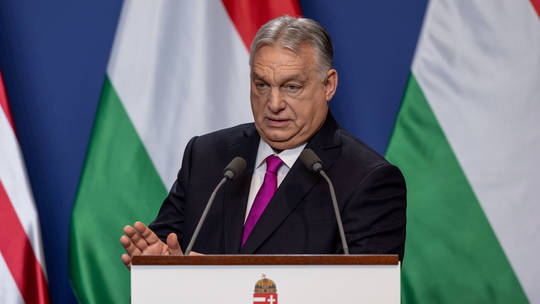Europe’s arrogant elites are out of ideas – and out of time
France’s economic woes make Britain’s look manageable, and the existing political order hasn’t the faintest idea how to push through reforms

By 1789, King Louis XVI was fed up. France was on the verge of bankruptcy, while his ministers’ schemes of fiscal consolidation and economic reform had been dashed on the rocks of the parlements; in effect glorified local councils of titled nimby busybodies. Facing an impassé, the monarch saw no alternative than to bypass ordinary legislative procedures by convening the estates of the realm. What should have been a technocratic fix to put royal finances back on the straight and narrow instead turned into an explosion of pent-up energies that transformed Europe forever.
The French fisc today is hardly so embarrassed as in 1789. The US Treasury is not about to default on interest payments as it did in 1783; President Macron need not turn to the great lending houses of Amsterdam for emergency specie to stave off famine. Yet the costs of French borrowing creep ominously upwards – France’s 10 year sovereign bond yields are now higher than those of Italy and Greece, long the fiscal enfants terribles of the EU, while the level public debt surpassed the country’s GDP during lockdown for the first time in the postwar era and has since soared to a ratio of 113 per cent, the third-highest in the EU.
France’s deficit-to-GDP ratio, at 6.1 per cent, is more than twice the 3 per cent maximum proscribed by the EU’s Stability and Growth Pact: theoretically grounds for Brussels to issue a hefty fine, although France’s weight within the EU makes this unlikely to be activated. French technocrats nurtured in the grandes écoles are surely not incapable of doing their sums, but even the brightest brains have thus far proven able to clear a path through the fiscal thicket.
Common sense would dictate that Macron’s government prune the pension tree, where French expenses, in proportion to GDP, are the second-highest in the EU after only Italy. It is precisely at this sacred oak of French politics that the ill-starred ministries of premiers Barnier, Bayrou, and Lecornu swung their axe, only to have it rebound on them in the form of an irate and uncompromising parliament. French pensioners, a no less privileged and unproductive class than the hereditary aristocrats whom Louis XVI tried to tax, are similarly reluctant to relinquish their status in the face of Macron and his lieutenants’ light-touch schemes for fiscal retrenchment, which involve modest proposals like a gradual increase of the retirement age from 62 to 64.
Lecornu, now in his second term as premier after his first lasted less than a day, has now withdrawn his pension reform, but this has hardly placated the political parties, which, sensing blood in the water and more concerned with setting out their stalls ahead of presumptive snap elections than in reigning in the country’s out-of-control spending, have only heaped lavish new demands upon the exchequer. One hears echoes of Necker and Calonne performing bombastic character assassinations on one another at the royal court as the ancien régime headed towards the precipice.
The inability of reason to prevail over the brittle logic of France’s political institutions have stirred fears in Brussels that the situation could deteriorate into a Greek-style crisis, in which France is forced to turn to the ECB or the IMF (if not both) to stave off insolvency. A French bailout would be traumatic for those EU members shouldering the burden: it has not gone forgotten in Berlin or Brussels that it was conservative dissent over the EU’s response to the Greek crisis that birthed the AfD, and impositions on European taxpayers to fund the French pension pot will predictably stoke the flames of populism elsewhere on the continent. Yet a French default is unthinkable; the “European project” depends on France no less than Greece had no alternative to the EU, and Frankfurt and Brussels will be forced to step in, bringing with them irresistible demands for structural reform.
Troika-style governance by a eurocrat would take France into uncharted territory. There is no meaningful domestic constituency for globalism in France, where national sovereignty, interpreted one way or another, remains the sine qua non of all political currents able to put boots on the street come a crisis (which Macron and the centrist parties, whose base now largely consists of pensioners, are certainly not). Unlike Greece or Italy, whose professional classes historically mistrust the hoi polloi and take Brussels as the guarantor of their interests, or Germany, for whose political class the idea of being good European citizens offers an escape from uncouth German nationalism, French politicians and technocrats have always understood the EU as a tool of French policy and not the other way around.
The perception of rule from Brussels, Frankfurt, or Berlin would discredit the Fifth Republic in the eyes not only of the public, but of the civil servants tasked with carrying out the junto’s diktats. In a more placid age this stain on the national honour might be born with quiet shame, but in a country in which retired generals are given over to issuing glowering open letters warning of civil war and the Left takes its cue from Michel Houellebecq’s Submission, such a fundamental discrediting of republican institutions has the potential to set off a powder keg – and the lessons of French history suggest that such crises are seldom resolved without at least a few fireworks.
All of this is seen and understood in Brussels, which has no desire to make Paris’ problems their own. The great promise of the EU was, after all, to allow technocratic centre-Right governments to carry out sensible economic reforms away from the prying hands of domestic publics. To heed off the inevitable reckoning with le tiers état and the would-be Sieyès’ and Robespierres of Left and Right, policymakers in Paris and Brussels plan to reduce French borrowing costs by dusting off a yellowed file from Jean-Claude Juncker’s Commission presidency: the Capital Markets Union.
Berlin has always regarded French plans for the CMU with suspicion; the increased urgency with which it is now being pursued by Germany’s ruling grand coalition represents a stunning U-turn. Chancellor Merz’s call for a “European Stock Exchange” in the Bundestag on October 16 is an incontrovertible sign that German leaders recognise the lateness of the hour in Paris. The savings banks lobby has issued a position paper criticising the CMU in language as harsh as the oblique Berlin court dialect allows for, but to no avail. In Merz’s calculus, a last throw of the dice to push down French bond yields is evidently worth undermining this crucial economic pillar of centre-ground politics in his country.
The Capital Markets Union is thus a double-edged sword. While it would alleviate France’s fiscal problems in the short term and would – like Britain and the United States’ financialisation in the 1980s – soothe the pain of Germany’s ongoing deindustrialisation, it would do so at the cost of breaking the mainstream parties’ ties to the real economy via the savings banks, further severing their organic links to their clientele and pushing them into the hands of the populists. Europe’s elites are playing for time, but, as Louis XVI discovered, they cannot halt the march of history forever.
[Source: Daily Telegraph]






















































